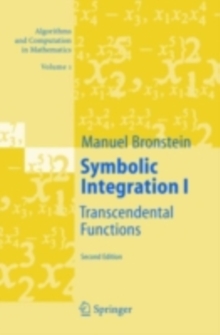
Computations in Algebraic Geometry with Macaulay 2 PDF
Edited by David Eisenbud, Daniel R. Grayson, Mike Stillman, Bernd Sturmfels
Part of the Algorithms and Computation in Mathematics series
Description
Systems of polynomial equations arise throughout mathematics, science, and engineering.
Algebraic geometry provides powerful theoretical techniques for studying the qualitative and quantitative features of their solution sets.
Re- cently developed algorithms have made theoretical aspects of the subject accessible to a broad range of mathematicians and scientists.
The algorith- mic approach to the subject has two principal aims: developing new tools for research within mathematics, and providing new tools for modeling and solv- ing problems that arise in the sciences and engineering.
A healthy synergy emerges, as new theorems yield new algorithms and emerging applications lead to new theoretical questions.
This book presents algorithmic tools for algebraic geometry and experi- mental applications of them.
It also introduces a software system in which the tools have been implemented and with which the experiments can be carried out.
Macaulay 2 is a computer algebra system devoted to supporting research in algebraic geometry, commutative algebra, and their applications.
The reader of this book will encounter Macaulay 2 in the context of concrete applications and practical computations in algebraic geometry.
The expositions of the algorithmic tools presented here are designed to serve as a useful guide for those wishing to bring such tools to bear on their own problems.
A wide range of mathematical scientists should find these expositions valuable.
This includes both the users of other programs similar to Macaulay 2 (for example, Singular and CoCoA) and those who are not interested in explicit machine computations at all.
Information
-
Download - Immediately Available
- Format:PDF
- Publisher:Springer Berlin Heidelberg
- Publication Date:14/03/2013
- Category:
- ISBN:9783662048511
Information
-
Download - Immediately Available
- Format:PDF
- Publisher:Springer Berlin Heidelberg
- Publication Date:14/03/2013
- Category:
- ISBN:9783662048511










